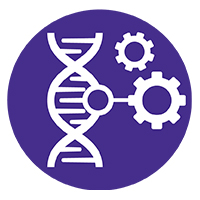Back
Advances in Therapeutic Development Across Modalities
Session: Rapid Fire: Recent Advances in Gene Therapy
Novel Alternatives to ELISPOT Assay for AAV Gene Therapy Clinical Studies
Monday, April 24, 2023
3:00 PM – 3:15 PM ET
Location: Salon E, 5th Floor
.jpg)
Ayuko Ota-Setlik, MS (she/her/hers)
Biomarker Clinical Assay Lead
Pfizer
Rapid Fire Speaker(s)
One of the potential concerns associated with viral vector-based gene therapies is the development of cellular immune responses which may result in loss of efficacy or tissue damage. ELISpot is a method commonly used to detect cellular immune response to specific antigens, much like the ADA and Nab assays are used to measure humoral responses.
The IFN gamma ELISpot of human peripheral blood mononuclear cells is the current standard FDA recommended safety biomarker assay to monitor cell-mediated immunity against AAV gene therapy vectors and transgene in AAV vector clinical studies. The ELISpot assay is semi-quantitative, sensitive to single-cell level and offers a broad dynamic range. The IFN gamma is a cytokine primarily secreted by activated T cells and natural killer cells, and a well-established marker for cell-mediated immunity.
However, there is a lack of consistency in correlating cellular immune responses with elevated ALT levels or decline in transgene expression with the IFN gamma ELISpot data. In addition, unlike ADA or Nab detecting analytical protocols, there is no regulatory guidance on how to develop and validate ELISpot methods besides the ELISpot harmonization consortium White Paper. The ELISpot assays require a more complex workflow from sample collection to testing, especially for larger multicenter studies. Sample collection and PBMC isolation procedures need to be carefully developed with the knowledge of the availability of certain equipment at the study sites.
There is a need to develop alternate assays that can better define the immune correlates in AAV therapy. These potential alternatives should take into consideration not only the sensitivity and specificity afforded by the IFN gamma ELISpot assay, but also improve on simplicity and testing turnaround times to facilitate the workflow in clinical setups with a global footprint. This presentation will describe potential alternate assays to measure T-cell responses in AAV-gene therapy, that are based on flow cytometry, genomic, and proteomic based technologies.
The IFN gamma ELISpot of human peripheral blood mononuclear cells is the current standard FDA recommended safety biomarker assay to monitor cell-mediated immunity against AAV gene therapy vectors and transgene in AAV vector clinical studies. The ELISpot assay is semi-quantitative, sensitive to single-cell level and offers a broad dynamic range. The IFN gamma is a cytokine primarily secreted by activated T cells and natural killer cells, and a well-established marker for cell-mediated immunity.
However, there is a lack of consistency in correlating cellular immune responses with elevated ALT levels or decline in transgene expression with the IFN gamma ELISpot data. In addition, unlike ADA or Nab detecting analytical protocols, there is no regulatory guidance on how to develop and validate ELISpot methods besides the ELISpot harmonization consortium White Paper. The ELISpot assays require a more complex workflow from sample collection to testing, especially for larger multicenter studies. Sample collection and PBMC isolation procedures need to be carefully developed with the knowledge of the availability of certain equipment at the study sites.
There is a need to develop alternate assays that can better define the immune correlates in AAV therapy. These potential alternatives should take into consideration not only the sensitivity and specificity afforded by the IFN gamma ELISpot assay, but also improve on simplicity and testing turnaround times to facilitate the workflow in clinical setups with a global footprint. This presentation will describe potential alternate assays to measure T-cell responses in AAV-gene therapy, that are based on flow cytometry, genomic, and proteomic based technologies.
Learning Objectives:
- Upon completion, the participant will be able to understand principles of the ELISpot assay for T-cell immune monitoring in clinical studies.
- Upon completion, the participant will be able to define the challenges of the current ELISpot assay for safety immunogenicity assessment in AAV-Gene therapy.
- Upon completion, the partcipant will be able to consider potential novel alternatives for antigen-specific T-cell immune monitoring.

